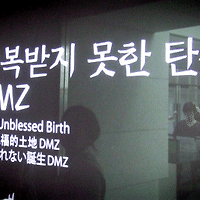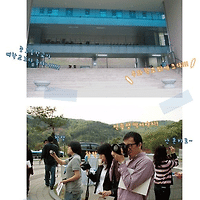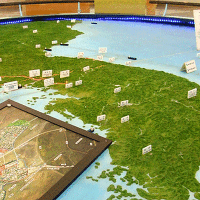What Does Unification Mean to the Average Korean College Student?
From August 4th-7th, our team (eight students from Wellesley College and one from Boston University) embarked on a four-day trip to visit the DMZ and drive along the 38th parallel line dividing North and South Korea. Our complete group was made up of student reporters from the Ministry of Unification, some student leaders from Kyung Won University, and a number of North Korean defector college students. During the many hours that we spent on the bus traveling from site to site along the border, we were able to share with each other about our backgrounds, our cultures, and most importantly discuss our opinions about North Korea and unification.
During our discussion times, one important question arose. Why does the average college student in South Korea have little or no knowledge, let alone passion, about North Korea and unification? The students from Kyung Won University were shocked when they heard the testimonies of the North Korean defectors and what their lives looked like before they escaped; they had no idea that people are starving to death from famine while rice in storage for the military rots away. Several people offered their opinions regarding this issue:
One person suggested that people just live too busy lives in general and have no time to be concerned about North Korea when they need to be concerned about themselves. Another reported that, even though South Korea sends aid in the form of food to North Korea, it goes entirely to their army and the citizens are still left starving to death. These events are reported on the news, and any efforts by South Koreans made to help North Koreans seem wasted because of governmental control. My opinion was that our generation, born after the Korean War, has no reason to have any passion about uniting the North and South because we were born into a divided nation.
Moreover, I found it ironic that most our team from America had much more knowledge on the issue of North Korea and its human rights violations than any other student in the group. However, none of us had ever thought seriously about unification up until this point. This whole trip pushed me to think again and again about unification. My personal conclusion was that unification is the best solution so far for the problems happening in North Korea. Human rights violations, economic crises, death from starvation, sex trafficking, and many more issues would disappear, or at least be mitigated, if we were to become one nation again.
Aside from my personal thoughts, I also have a suggestion for the Ministry of Unification and educators in Korea who want to share the need and personal passion for unification. My friends and I did not come upon the unification issue first; rather, we stumbled upon it this summer during our community service time to help North Korean defectors. It was the horrific events that were happening in North Korea, the tragic stories of the refugees that we heard, that really influenced us and started the fire in our hearts. I believe that if our parents’ generation wants to pass on to us their passion to unite these two countries again, they need to take a different approach in educating the children of this generation. If they present the true situation inside North Korea right now, wouldn’t people be moved to help others, not even of another race but of their own heritage and blood? I firmly believe that many others will make the same conclusion that I did this summer: in order for anyone to help North Koreans—whether civilians, defectors, or refugees—the best and fastest way is through unification. One country may help another country, but with limits. Inside one country there may be states, but there is so much more we can do as one nation.

한국 대학생들에게 있어 통일이란?
Christine Oh
8월 4일부터 7일까지 8명의 웰즐리 칼리지 학생과 1명의 보스턴 대학교 학생으로 구성된 우리 해외학생 기자단은 남과 북을 가르고 있는 38선 주변을 따라 4일 일정으로 DMZ 지역을 탐방하는 기회를 가졌다. 우리는 경원대 학생들과 탈북 대학생들로 이루어진 통일부 소속 학생기자단과 함께 한 팀을 구성하여 탐방을 떠났다. 버스를 타고 휴전선을 따라 장소를 이동하며 탐방을 했기 때문에, 많은 시간을 팀원들과 함께 버스에서 보냈다. 우리는 서로의 배경과 문화에 대해 알게 되었고, 특히 북한과 통일에 대한 서로의 의견을 나눌 수 있었다.
토론 시간에 대두된 가장 중요한 문제는 바로 “왜 한국 대학생들은 보통 북한과 통일 문제에 대해 열정을 갖는 것은 고사하고 아는 바가 거의 없는 것일까?” 경원대 학생들은 탈북자 출신 기자들이 북한을 떠나기 전 자신들의 삶이 어떠했는가 이야기를 듣고 큰 충격을 받았다. 그들은 인민군을 위한 쌀이 창고에서 썩어나가는 동안 북한 주민들은 기아로 굶어 죽어가고 있다는 사실을 전혀 모르고 있었다. 우리는 왜 이렇게 한국 대학생들이 북한 문제에 무관심한가에 대해 의견을 나누어 보았다.
한 친구는 사람들이 살기 바빠, 자신들의 문제를 걱정하느라 북한문제에 관심을 가질 틈이 없는 것이라고 말했다. 또 다른 친구는 한국에서 식량을 북한에 보낸다 해도, 모조리 군대로 보내지고 북한 주민들은 여전히 굶어죽고 있기 때문이라고 말했다. 이러한 경우가 여러 번 뉴스에 보도되었고 남한에서 북한 주민들을 돕기 위해 어떤 노력을 기울이든 북한 정부의 통제 때문에 무용지물이 된다는 것이었다. 나는 우리가 전후 세대로서, 이미 남과 북으로 분단된 국가에서 태어났기 때문에 남북 통합에 대한 열정을 가지고 있을 이유가 없기 때문이라고 생각한다.
더욱 아이러니한 사실은 대부분 미국에서 온 친구들이 다른 어떤 팀원들 보다 북한 문제와 인권 침해 실상에 대해 더 잘 알고 있었다는 점이다. 사실 우리 중 그 누구도 이때까지 통일에 대해 진지하게 생각해 본적은 없었다. 그러나 이번 탐방 기간 내내 나는 통일에 대해 생각해 보지 않을 수 없었다. 내가 개인적으로 내린 결론은 현재로서는 지금 북한에서 일어나고 있는 여러 문제를 해결할 수 있는 최선의 방법이 바로 통일이라는 것이다. 만약 남과 북이 하나의 국가가 된다면 북한의 인권 침해, 경제 위기, 기아로 인한 대량 아사 사태, 성매매를 위한 인신 매매 등과 같은 많은 문제들이 사라지거나 최소한 완화될 것이다.
이에 덧붙여, 나는 통일부와 통일에 대한 열정을 가지고 있는 한국의 교육자들께 한 가지 제안을 드리고 싶다. 사실, 우리들도 처음부터 통일문제를 생각했던 것이 아니었다. 우리는 이번 여름동안 북한 이탈주민들을 도와주는 사회봉사에 참가했었다. 우리의 가슴에 통일에 대한 불을 지폈던 것은, 다름 아니라 우리가 북한 이탈주민으로부터 들었던 북한에서 일어나고 있는 참혹한 이야기들이었다. 만약 우리 부모세대가 우리에게 진정으로 통일에 대한 열정을 물려주길 원한다면, 우리 세대 아이들을 교육하는 방식에 있어 다른 접근방법을 취해야 한다고 생각한다. 만약 우리 부모님들이 북한의 실상을 그대로 이야기해준다면, 하물며 다른 민족에게도 그럴진대, 같은 핏줄 같은 민족인 그들을 돕고 싶은 마음이 생기지 않겠는가? 나는 많은 팀원들이 이번 여름 내가 내린 결론과 같은 결론을 내렸을 거라 확신한다. 북한 시민이든, 탈북자든, 난민이든 간에 북한 주민을 돕기 위한 가장 빠른 길이자 최선의 길은 통일이다. 한 국가가 다른 국가를 돕는 데에는 한계가 있다. 그러나 한 국가 내에서라면, 우리가 할 수 있는 일이 더 많을 것이다.
* 이 기사는 통일부 해외기자단 1기 오예진(Christine Oh, 美 Wellesley College) 기자가 쓴 기사로,
영문과 국문을 같이 제공하고 있습니다.
'대학생기자단 > 해외상생기자단' 카테고리의 다른 글
| Is unification of the two Koreas really necessary? (0) | 2010.10.05 |
|---|---|
| Before and After Thoughts About the Student I Tutored at 한겨레 (0) | 2010.09.20 |
| Unification, Benjamin Button Style (0) | 2010.09.15 |
| In Her Shoes (0) | 2010.09.06 |
| Joint Conference Report on Premier Wen's Pyongyang Visit (0) | 2009.12.11 |



